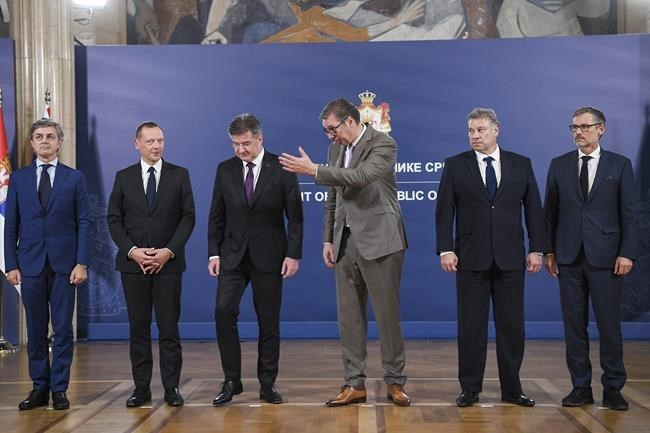
In this photo provided by the Serbian Presidential Press Service, Serbian President Aleksandar Vucic, third right, welcomes Italian diplomat Alessandro Cattaneo, left, French President's Advisor Emmanuel Bonne, second left, European Union envoy Miroslav Lajcak, third left, US Deputy Assistant Secretary Gabriel Escobar, second right, and German Chancellor's Advisor Jens Plettner, right, in Belgrade, Serbia, Saturday, Oct. 21, 2023. The envoys of the European Union and the United States urged on Saturday Kosovo and Serbia to resume dialogue as the only way to de-escalate the soaring tension between the two nations. This is the first such visit since Sept. 24 when around 30 Serb gunmen crossed into northern Kosovo, killing a police officer and setting up barricades, before launching an hours-long gun battle with Kosovo police. (Serbian Presidential Press Service via AP)
Republished October 23, 2023 - 6:58 AM
Original Publication Date October 23, 2023 - 4:46 AM
PRISTINA, Kosovo (AP) — Kosovo’s prime minister on Monday claimed that a criminal gang from northern Serbia was behind a September attack in Kosovo that killed a police officer and involved a daylong gunbattle with Kosovo police that left three gunmen dead.
Prime Minister Albin Kurti also alleged that Serbia’s Defense Minister Milos Vucevic heads the gang known as the “Novi Sad Clan,” named after the Serbian city of Novi Sad, and further compared Serbian President Aleksandar Vucic to a mafia boss.
Kurti offered no evidence to back his claims and did not elaborate. He described the gang as a “paramilitary terrorist group.”
Belgrade swiftly dismissed the claims. Serbia's Defense Ministry said it “absolutely rejects the heinous and blatant lies told today by Kurti” and appealed to the international community to act to stop the “incendiary and dirty” campaign by Kosovo's leadership.
Tensions between Serbia and Kosovo flared anew on Sept. 24 when some 30 heavily armed Serbs barricaded themselves in an Orthodox monastery in northern Kosovo, setting off the fighting.
The clashes were among the worst since Kosovo declared independence from Serbia in 2008. It came as the European Union and the United States were trying to mediate and finalize years-long talks on normalizing ties between the two Balkan states.
On his Facebook page, Kurti on Monday proposed that the European Union and the United States “create a special court” for the Novi Sad gang since Kosovo has no jurisdiction inside Serbia.
Kosovo has accused Serbia of orchestrating the Sept. 24 “act of aggression” against its former province whose 2008 declaration of independence Belgrade doesn’t recognize.
Serbia has denied this, and said it suspected an ethnic Serb leader from Kosovo, Milan Radoicic, in the clashes. Radoicic was briefly detained, questioned and released in Serbia earlier this month.
On Saturday, EU and U.S. envoys visited Kosovo and Serbia, urging the sides to resume dialogue on normalizing relations before the bitter tensions result in more violence.
The EU put forward a 10-point plan in February to end months of political crises between the two sides. Kurti and Vucic gave their approval at the time but expressed reservations, which have not been resolved since. It’s unclear when another round of meetings might take place, and the EU appears to have little leverage left.
Kosovo has called on the EU to sanction Serbia for the September flareup and demanded more security.
NATO sent reinforcements to its Kosovo force or KFOR, boosting the 4,500 troops on the ground with an additional 200 troops from the United Kingdom and more than 100 from Romania. It also sent heavier armaments to beef up the peacekeepers’ combat power.
Serbia and its former province of Kosovo have been at odds for decades. Their 1998-99 war left more than 10,000 people dead, mostly Kosovo Albanians.
___
Semini reported from Tirana, Albania. Associated Press writer Dusan Stojanovic in Belgrade, Serbia, contributed to this report.
News from © The Associated Press, 2023